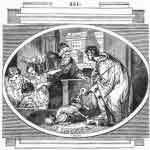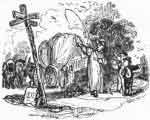A Mountebank traveled the country showing his Dog doing tricks. Epictetus praised these actions as it showed the excellence of learning.
Good education is of infinite importance.

Northcote
A certain Charlatan, who gained his livelihood by travelling about the country, and exhibiting the tricks of a little Dog which he had trained up to his purpose, was one day showing this curious little animal in the public market-place of the city, to a delighted and wondering populace. He made his Dog who was perfectly well taught, display a thousand tricks; all which be performed with such ready understanding and attention to his master, that he seemed endowed with human intellect. Epictetus the philosopher was amongst the spectators, and seemed particularly delighted with the amusement. This raised the wonder of those present who knew the dignity of his character; but their wonder ceased, when Epictetus, whose peculiar method was to draw excellent morals from the meanest things and most trifling circumstances, exclaimed: “Oh! the glory of knowledge! Oh! the great felicity of the most serene virtues! The only rich patrimony of mankind! Rejoice with me, my good friends, at this instructive sight, which shows the excellence of learning; since you see there, that the little knowledge which a man has been able to beat into a Dog, is sufficient not only plentifully to maintain his Master, but to furnish to him the noblest enjoyment which a great soul is capable of, by enabling him to travel through all nations, and see the wonders of Nature!”
Application
We may perceive by this Fable, the infinite importance of a good education, which had been the means of raising a poor little brute to become the admiration of mankind. For notwithstanding that education may not be supposed to add to the original portion of intellect, with which nature has at first endowed us, yet it may and certainly does concentrate those powers that we have; like as the lens collects to a focus the scattered rays of light, and brings them to a burning point, which otherwise would be dissipated, and lose all their power. This is chiefly what education can do, it draws to one object the wandering energies of the mind, be they great or small; stores the memory with useful knowledge; fills up that time which otherwise would be wasted in idleness, or what is worse, employed in mischief; directs us to a nice discrimination of right from wrong, fits us for the most enlightened society, and enables us to pass through this difficult life with comfort and reputation. J. N.

